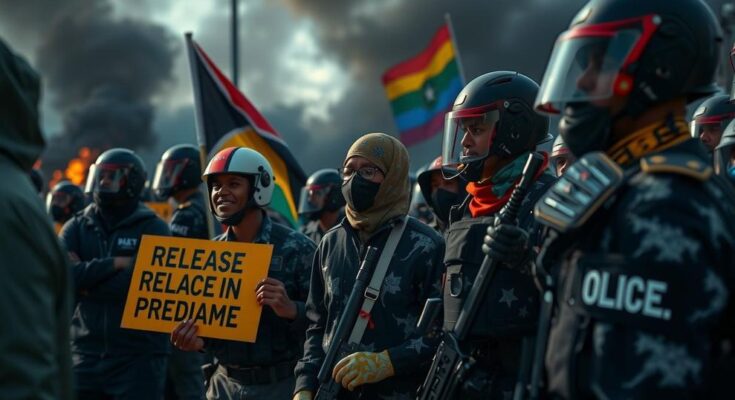IKSur calls for the release of six men charged in the May 2023 Pikin Saron riots. The unrest, linked to grievances among the Kaliña Amerindian tribe against the Surinamese government, led to violence resulting in police shootings. IKSUr highlights systemic discrimination and demands accountability and justice for the indigenous community.
On Friday, the Indigenous Collective Suriname (IKSur) urged for the release of six individuals who are facing trial related to the May 2023 riots in Pikin Saron. The verdict is set to be announced today, following a tumultuous incident on May 2, 2023, wherein police engaged in a shootout resulting in the deaths of two men. The unrest was reportedly incited by discontent among the Kaliña Amerindian tribe regarding the government’s treatment of indigenous peoples. In a strong public statement, IKSur chairman Lloyd HF Read articulated the ongoing discrimination encountered by indigenous communities, emphasizing the historical grievances stemming from colonial displacement and ongoing neglect by the Surinamese authorities. He lamented the lack of adequate social services and the struggle against the illegal appropriation of indigenous lands by both government and private interests, remarking that, “As the first inhabitants, we were driven from the coastal plain to the interior by the colonials.” The IACHR previously ruled in favor of the Kaliña and Lokono peoples in their fight for land rights, declaring that Suriname had violated their collective property rights by failing to legally recognize their land. However, IKSur contends that the Surinamese government has not complied with this ruling and continues to exploit indigenous territories. The unrest in May, which led to violence, stems from deep-seated issues of injustice and marginalization. IKSur has expressed its outrage over the ongoing detention of the six suspects, who have reportedly been held under inhumane conditions for 1.5 years without adequate legal proceedings. They argue that the legal actions pursued are punitive rather than investigative, aimed at silencing indigenous dissent and perpetuating a narrative of terrorism against native populations. They stated, “This shows how the government treats us as a very vulnerable group and we do not think and hope that you will look away from this injustice.” In conclusion, IKSur has called for increased awareness from the international community regarding the systemic issues facing indigenous peoples in Suriname. They are advocating for equal treatment within the legal system and demand accountability for the state’s actions, as the ongoing marginalization continues to threaten their rights and existence.
The current situation in Suriname highlights the tension between indigenous groups and the government pertaining to the treatment of indigenous peoples, land rights, and systemic discrimination. The Kaliña and Lokono peoples have historically faced challenges in asserting their rights to their ancestral lands and receiving adequate governmental support. The events of May 2023 were not isolated incidents but rather a culmination of ongoing grievances against government practices that disregard indigenous rights as mandated by international law. The legal and social ramifications of these events are significant, and the international community’s insights will be crucial in addressing concerns raised by indigenous organizations such as IKSru.
The Indigenous Collective Suriname advocates for the release of six men involved in the Pikin Saron riots of May 2023, citing their ongoing detention under dire conditions and the lack of a thorough investigation into the violence that occurred. The organization highlights a persistent pattern of discrimination faced by indigenous peoples and urges the government to comply with human rights obligations. The plight of the Kaliña and Lokono peoples reflects broader issues of justice and equity that remain unresolved in Suriname.
Original Source: caribbean.loopnews.com




